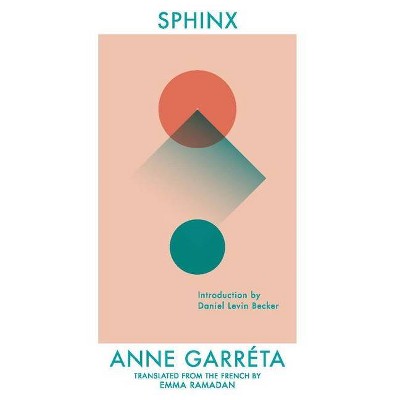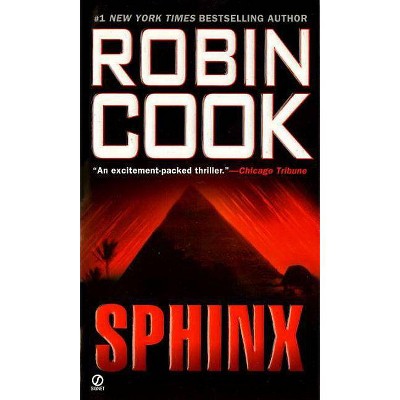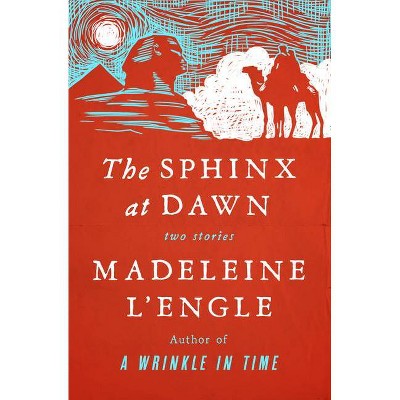Sphinx - by Anne Garréta (Paperback)

Similar Products
Products of same category from the store
AllProduct info
<p/><br></br><p><b> About the Book </b></p></br></br>A landmark literary event: the first novel by a female member of Oulipo in English, a sexy genderless love story.<p/><br></br><p><b> Book Synopsis </b></p></br></br><b>Nominated for the 2016 PEN Translation Prize</b><br><b>One of <i>Flavorwire</i>'s Top 50 Independent Books of 2015</b><br><b>One of <i>Entropy Magazine</i>'s Best Fiction Books of 2015</b><br><b>One of <i>Bookriot</i>'s 100 Must-Read Books Translated From French</b><br><p><i>Sphinx</i> is the remarkable debut novel, originally published in 1986, by the incredibly talented and inventive French author Anne Garréta, one of the few female members of Oulipo, the influential and exclusive French experimental literary group whose mission is to create literature based on mathematical and linguistic restraints, and whose ranks include Georges Perec and Italo Calvino, among others.</p><p>A beautiful and complex love story between two characters, the narrator, I, and their lover, A***, written without using any gender markers to refer to the main characters, <i>Sphinx</i> is a remarkable linguistic feat and paragon of experimental literature that has never been accomplished before or since in the strictly-gendered French language.</p><p><i>Sphinx</i> is a landmark text in the feminist, LGBT, and experimental literary canons appearing in English for the first time.<br><p/><br></br><p><b> Review Quotes </b></p></br></br><br>A dark, pulsing romance, tortured and thrilling and sexy, breaking open our preconceived notions of love and writing.--<b>Sarah Gerard, Books Are Magic Bookstore (Brooklyn, NY)</b> <p/>The set-up is such a classic, relatable tale of falling in -- and out -- of love that one wonders why gender has always been such a huge factor in how we discuss relationships, in fiction and otherwise. . . . So, the author, and the translator, created their own language, championing love and desire over power and difference. -- <b>Maddie Crum, <i>Huffington Post</i></b> <p/>The strength of [<i>Sphinx</i>] lies in its philosophical eloquence . . . Take away gender and race from the book, and what's left? Love, viewed as a nihilistic transcendence . . . considerably more than a language game." -- <b>Adam Mars-Jones, <i>London Review of Books</i></b> <p/>In this sense, just as the novel is genderless, it is also gender<i>full</i> . . . Garréta finds endless shades of in between and out of bounds, her characters taking shapes no other text before--or since--has imagined. -- <b>Lauren Elkin, <i>Bookforum</i></b> <p/>Garréta's aim was to overthrow gender binaries carried by language, and in light of recent demands by transgender groups to use gender neutral pronouns, <i>Sphinx</i> seems curiously prescient. -- <b>Catherine Humble, <i>The Times Literary Supplement</i> (<i>TLS</i>)</b> <p/>[Garreta's] been called influential and groundbreaking, and with this, her first translation into English, it is easy to see why. Sphinx is an important contribution to queer literature--fascinating, intelligent, and very welcome. --<i><b>Lambda Literary</i></b> <p/>"Sphinx challenges automatisms, identification mechanisms, and the urgent need for gender categorization. The absence of linguistic gender acts as a mirror reflecting back the reader's projections." -- <b>Gaëlle Cogan, <i>Kenyon Review</i></b> <p/><i>Sphinx</i> is an almost effortlessly readable, atmospheric love story, like a Marguerite Duras novel starring a pair of genderless paramours who haunt the after-hours clubs and cabarets of Paris. The conceit is so simple and so potent that it's impossible to get too far without pondering big questions about the role gender plays in the way we think about love in literature -- and in life. -- <b><i>Flavorwire</i> Staff Pick</b> by editor-in-chief <b>Judy Berman</b> <p/>For Garréta, it just may be possible then that the body occupies the space of language as powerfully as its capacity to produce it. -- <b>Tyler Curtis, <i>BOMB Magazine</i></b> <p/>Sphinx is a novel of passion and loss that transcends gender and speaks to the universality of desire and loss, morality, spiritual crisis and the need to connect and belong. It's also a novel that captivates and propels the reader to question the boundaries of desire and memory--and which one ultimately holds us captive. -- <b>Monica Carter, <i>Three Percent</i></b> <p/>A unique novel, Sphinx succeeds in telling a love story without names or genders, allowing the reader to interpret the novel however they wish. Set in Paris and calling to mind the work of James Baldwin, this both feminist and LGBT book is deeply evocative in its word usage as it celebrates love without the constraints of gender. -- <b><i>World Literature Today</i></b> <p/>I must start by saying that I simply devoured this book. Its romp through seamy Paris nightclubs; its exacting portrait of a passionate affair; and its exploration of both mileus with a deft mixture of immediacy and intellectual detachment had me absolutely obsessed with it -- I just had to know what was happening next.? -- Miriam Bridenne, Albertine Books, 4 French Women Writers To Discover This Summer! <p/>A powerfully compelling narrative. -- <b>Tobias Carroll, <i>Vol. 1 Brooklyn</i>, A Year of Favorites</b> <p/>Centering her tale on the love and lust of a young couple in the Parisian underworld allows Garréta to train our eyes on the physical beauty of youth, the sensuality of anonymous bodies, and our preconceptions regarding both. The bodies of <i>je</i> and A***, left bare of gender markers, create the need for a new, more vigilant kind of reading that involves a constant undoing of assumptions. They cry: <i>Read yourselves, not just us</i>. -- <b>Jane Yong Kim, <i>Words Without Borders</i></b> <p/>"One of the most engaging Oulipian novels to date. It's a remarkable genderless love story-- complex and mesmerizing." -- <b>Derek Pell, <i>Zoom Street</i></b> <p/>However, the fragments that do surface from this unconscious reservoir are vividly and eloquently incarnated. This is particularly true of the prose around lights, music, and bodies--the primary elements that compose nightclubs. They are rendered in rapturous tones . . . I could go on--exquisite fragments like these are packaged in nearly every page. -- <b>John Taylor, <i>The Rumpus</i></b> <p/>Garréta's removal of gendered grammar is less an indictment of gender--or sign-bearing bodies--and more of a narrative challenge, a queering of language. This is also to say Sphinx is less of a queer romance novel than it is a poetic queering of love itself. -- <b>Meghan Lamb, <i>The Collagist</i></b> <p/>One of the <b><i>Dallas Observer</i></b>'s 13 Books to Read this Summer</i></b> <p/><i><b>The Paris Review</i></b> Staff Pick by Charlotte Groult <p/>Featured in <b><i>Off The Shelf</i></b>'s 12 Innovative books to get you out of your reading rut <p/>The body may be divine, but it can only be seen in such close focus that individual limbs can hardly be distinguished: we are left with flesh and bone, plus a few spinning hormones. --<b>Joanna Walsh, <i>The National</i></b> <p/>I must start by saying that I simply devoured this book. Its romp through seamy Paris nightclubs; its exacting portrait of a passionate affair; and its exploration of both mileus with a deft mixture of immediacy and intellectual detachment had me absolutely obsessed with it -- I just had to know what was happening next. --<b> Tom Roberge</b>, <b>Albertine Books</b> Staff Pick <p/>Spectacular. --<b>Aaron Westerman, <i>Typographical Era</i></b> (5-star review) <p/>Quite remarkable, and a rewarding piece of experimental--in the best senses of the word--fiction. --<b>Michael Orthofer, <i>Complete Review</i></b> <p/>We search for signs from our lovers. We search for signs from those of us who we would like to be our lovers. The media, the market all of those things they tell us which signs belong with whom. <i>Sphinx</i> subverts all of this, offering the reader signs that can be aligned to anyone of any gender. But the book does something beyond this game of language and gender. Garréta is asking her readers to change their perception of a tale of lovers. This is no small task and elevates her Oulipo trickery beyond linguistic change and into the realm social change as well. -- <b>Allison Grimaldi-Donahue, <i>Queen Mob's Teahouse</i></b> <p/>Masterful...an extremely ambitious experiment pushing the boundaries of language. -- <b>Sarah Coolidge, <i>Zyzzyva</i></b><br>"Garréta's elimination of gendered language [is] a kind of prolonged zero moment, a drawn-out suspension that does not eliminate gender so much as create a placeholder for it. In this way, Garréta's novel serves as an invitation for readers to stay with the uncertainty produced by bracketing the gender question." -- <strong>Taylor Eggan, <em>The Exploded View</em></strong><br>Garréta's stylistic experiment has been carried out at once boldly and discreetly -- it is difficult not to be lured into the story . . . [Emma Ramadan] has skillfully brought this thought-provoking novel to the English-reading world, where it has long been overdue. -- <b>John Taylor, <i>The Arts Fuse</i></b> <p/>Untethered from the genre you've unconsciously assigned it, the story expands. Love, like the universe has a way of doing that. And yet you sense a helplessness in the narrator to try, like you were, to pin something down. -- <b>Leah Dieterich, <i>The Art Book Review</i></b> <p/>The reader is both forced and free to provide what the author has pointedly left out of the text. Even if a reader is aware of the book's constraint, moving his or her or their eyes across the page at a sufficient speed, the reader begins to add the pronouns Ramadan was so careful to exorcise. Which ones in particular will vary: the book is a Rorschach test for each reader's assumptions about gender and the writing of gender. These assumptions are as likely to be conditioned by clues within the text as by the knowledge of paratextual facts about it. -- <b>Ryan Ruby, <i>3 Quarks Daily</i></b> <p/>"Sphinx lets us glimpse a world where one may be free to not be defined by gender, or to even evade it altogether, opening up almost infinite possibilities of identification for readers."-- <strong>A.K. Afferez, <em>Ploughshares Blog </em></strong><br> Listed among McNally Jackson's favorite literature of the decade!</b> <p/>"Both the original French and the English translation are masterpieces of subtly manipulating the text to accomplish something politically and culturally powerful: erasing gender from the plot and language. Still shockingly resonant some thirty years after Garreta wrote the original, and given a new context with the English translation in 2015, the love affair at the center of "Sphinx" is rendered with an incredibly astute precision, especially when it comes to passing, fleeting emotions. It breaks your heart and bowls you over at the same time."--Tom Roberge, riffraff (Providence, RI)</b> <p/>"<i>Sphinx<i> was the first book that I read that really got me fascinated with the intricacies in language. Reading Emma's translator's note in the book blew my mind away and gave me such a deep appreciation for the art of translation."--Cristina Rodriguez, Deep Vellum Bookstore (Dallas, TX)</b> <p/>The biggest surprise is Anne Garréta, whose novel Sphinx, first published in 1986, explores DJ culture, gender and sexual politics in Parisian nightclubs. The two main characters are the narrator and their lover A***, the sex or gender of neither of whom is given. Sphinx (available in Emma Ramadan's 2015 English translation) is ahead of its time, a radical bridge between Kathy Acker, the "chemical generation" authors of the 90s, and emerging innovators such as this year's Goldsmiths prize-nominated Isabel Waidner. -Tony White, <i>The Guardian<i></p>"Verve, loss, mourning, death. All in a moment which come upon us. Perhaps we wouldn't talk so much about this book if not for its feats. But its narrator driven to give tangibility and record to memory, too leaves a lasting image." -- <em>More Bedside Books</em> Blog <p>"...Sphinx highlights the already limiting nature of language when it comes to matters of gender, and of love." <b>--Stephanie Hayes, <i>The Atlantic</i></b></p><br><p/><br></br><p><b> About the Author </b></p></br></br>Anne F. Garréta is the first member of the Oulipo to be born after the founding of the Oulipo. A normalien (graduate of France's prestigious École normale supérieure) and lecturer at the University of Rennes II since 1995, Anne F. Garréta was co-opted into the Oulipo in April 2000. She also teaches at Duke University as a Research Professor of Literature and Romance Studies. Her first novel, <i>Sphinx</i> (Grasset, 1986), hailed by critics, tells a love story between two people without giving any indication of grammatical gender for the narrator or the narrator's love interest, A***. Her second novel, <i>Ciels liquides</i> (Grasset, 1990), told the fate of a character losing the use of language. In <i>La Décomposition</i> (Grasset, 1999), a serial killer methodically murdered characters from Marcel Proust's <i>In Search of Lost Time</i>. She met Oulipian Jacques Roubaud in Vienna in 1993, and was invited to present her work at an Oulipo seminar in March 1994 and again in May 2000, which led to her joining the Oulipo. She won France's prestigious Prix Médicis in 2002, awarded each year to an author whose "fame does not yet match their talent" (she is the second Oulipian to win the award--Georges Perec won in 1978), for her latest novel, <i>Pas un jour</i> (Grasset, 2002). <p/>Emma Ramadan is a graduate of Brown University, and received her Master's in Literary Translation from the American University of Paris. Her translation of Anne Parian's <i>Monospace</i> is forthcoming from La Presse. She is currently on a Fulbright Fellowship for literary translation in Morocco.
Price History
Price Archive shows prices from various stores, lets you see history and find the cheapest. There is no actual sale on the website. For all support, inquiry and suggestion messagescommunication@pricearchive.us




















